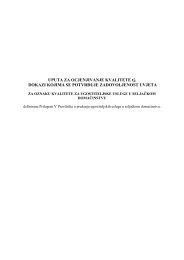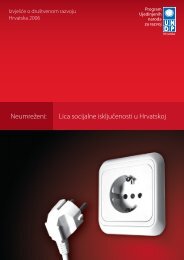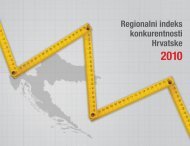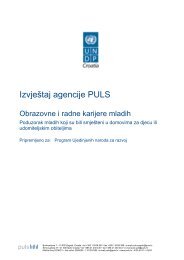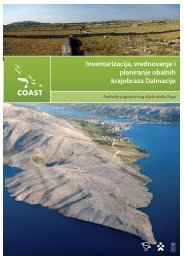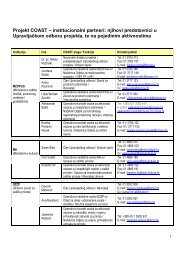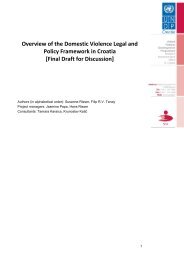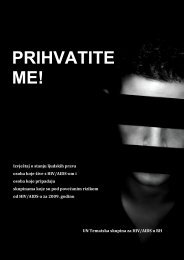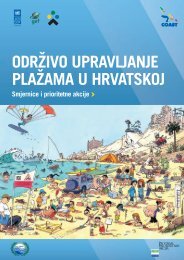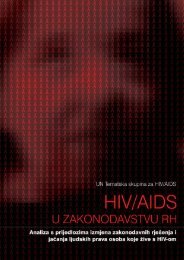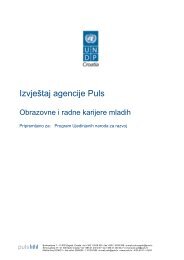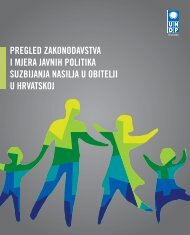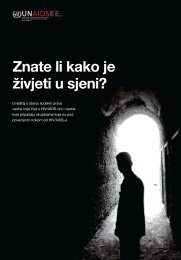WEB engleska verzija end.indd - UNDP Croatia
WEB engleska verzija end.indd - UNDP Croatia
WEB engleska verzija end.indd - UNDP Croatia
- No tags were found...
You also want an ePaper? Increase the reach of your titles
YUMPU automatically turns print PDFs into web optimized ePapers that Google loves.
THE SOCIALLY EXCLUDEDCHAPTER 3housing would help to reduce the stigmas associatedwith homelessness. This will also mobilise local communitiesand the business sector in helping to developand support programmes. It is the task of the state toensure social housing programmes for families whohave lower incomes. The present state incentives programmesfor housing mostly target the strata of bothemployed and credit-worthy individuals.In order to successfully reduce the risk of homelessness,it is necessary to use continuing and systematicintersectoral cooperation between all referential socialservices like social welfare, health care, education,labour and employment, family and housing policies.Preventive activities aimed at socially vulnerablefamilies could significantly reduce the risk of homelessness.Multidisciplinary teams should developassistance in the community (family, schools andstreets), because when a person addresses the socialservices, he/she is usually already so troubled thatthey cannot resolve the situation on their own.The working principle of social services should beindividual case management and active monitoringof social programme users to enable them toleave the system as soon as possible. The plannedinformation-sharing/expansion via database connection,both vertically (between the state, county andlocal level) and horizontally between sectors (socialwelfare, pension, health system, employment, education,etc.) would contribute to greater efficiency andbetter targeting of social welfare.Legislative regulation of homelessness should bedeveloped. All the present forms of assistance (forexample rent assistance, emergency repairs, debt relief,and one-time assistance with heating costs) canonly be exercised by people who have a permanentresidence in a location that falls under the jurisdictionof a Centre for Social Welfare. Shelter users have alsoidentified the need for free legal assistance whichcould be organized through non-governmentalassociations, with support from the state and localcommunity. 150 In many cases, timely legal assistancecould prevent citizens from becoming the victims offinancial or property fraud. Accessible legal advice onoptions concerning social rights could enable individualsto resolve unforeseen difficulties themselves.3.13 People living with HIVBox 19: Personal ExperienceN. is 59 years old and lives with his family in asmall town in <strong>Croatia</strong>. Seven years ago he testedpositive for HIV and, until obtaining triple therapy(antiretroviral), he had considerable healthproblems. As a result of a previous traffic accident,N. had 20% impaired vision in one eye. Only oneophthalmologist in <strong>Croatia</strong> was willing to examineN. Together with another special doctor engagedin providing treatment to patients living with HIVin <strong>Croatia</strong>, he determined that a vitrectomy wasthe only way of restoring his sight.In <strong>Croatia</strong>, such surgery is performed at onlyone clinic in Zagreb and the waiting line islong. However, N. was informed that patientsliving with HIV are not allowed to receive suchtreatment because the instruments are “veryexpensive and after the surgery they would notbe fit for use again.” It is a known fact that whensuch operations are performed, the instrumentsare not thrown away. Thanks to the persistenceof a <strong>Croatia</strong>n doctor and the NGO <strong>Croatia</strong>nAssociation for HIV, a solution was found. The<strong>Croatia</strong>n National Institute for Health Insurance(HZZO) was contacted, suggesting the treatmentbe performed abroad at the expense of HZZO.The opinion of a <strong>Croatia</strong>n medical board wasrequired. However, only the test results werereviewed (in a matter of seconds) and a personto-personexam was not carried out. The opinionwas provided: “… [that] the surgery would notbring any major change; the question is whetherthe patient would be able to <strong>end</strong>ure such asurgery..“, and one specialist even added: “Whatdoes he want this for? He is going to die anyway!“In spite of everything, N. successfully underwentsurgery abroad and returned to <strong>Croatia</strong>.Source: <strong>Croatia</strong>n Association for HIV (CAHIV). Published inthe <strong>Croatia</strong>n Association for HIV bulletin: „HIV/AIDS INFO“ I/II2001, also available at www.huhiv.hr.150 The lawyer engaged through the Association MoSt in Split was not able to take over all lengthy court procedures and bring them totheir conclusion, so that she mostly helps in the form of advice. The procedures mostly relate to probate proceedings, division of property,divorce proceedings, and in some cases there are also criminal procedures against the users of the Reception Centre (non-payment of childsupport, neglecting children, petty thefts and destroying other people’s property and the like).111



